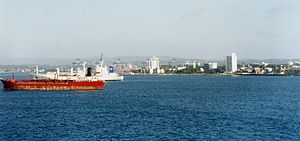Water supply and sanitation in Panama
Water supply and sanitation in Panama is characterized by relatively high levels of access compared to other Latin American countries.Panama has a tropical climate and receives abundant rainfall (up to 3000mm per year), yet the country still suffers from limited water access and pollution.[2] An estimated 7.5-31% of Panama's population lives in isolated rural areas with minimal access to potable water and few sewage treatment facilities.[5] The Panamanian Health Ministry is responsible for defining the sector's policy, whereas the Autoridad Nacional de los Servicios Públicos ASEP or National Authority for Public Services acts as regulatory agency.To significantly increase IDAAN's investments in urban areas, the government decided in 2003 to use financial resources earned through the telecommunication and electricity companies' privatization.In 2006, the government of Martín Torrijos established the Programa de Desarrollo Comunitario para Infraestructura Pública (PRODEC) or Community Development for Public Infrastructure Program (see below).PRODEC aims at investing US$100m of the Panama Canal's gains into community infrastructure, including water supply and sanitation.The World Bank supports the sector through a US$32m loan for the Water Supply and Sanitation in Low-Income Communities Project which is executed by the Ministry of Health.The Japanese Overseas Economic Cooperation Fund (OECF) supports sanitation in the city and the bay of Panama through a loan for constructing a sewage plant.

improved water sourceimproved sanitationWater supplysanitationPanamaEl Niñorainwater harvestingcoliformsBocas del ToroWaterborne diseasesdiarrheaparasitosisUNICEFurban areasBoqueteColónMireya MoscosoMartín TorrijosDarién ProvinceBocas del Toro ProvinceEuropean Investment BankarticlesHistoryto 18211821–19031904–19641964–19771977–presentSeparation from ColombiaReunification of Gran ColombiaGeographyCitiesDarién GapEarthquakesIslandsNational parksRiversVolcanismPoliticsAdministrative divisionsConstitutionElectionsForeign relationsLaw enforcementNational AssemblyPenal systemPolitical partiesPresidentsPublic ForcesNational PoliceSENAFRONTEconomyAgricultureBankingBalboa (currency)Mineral industryPanama CanalTelecommunicationsTourismTransportDemographicsEducationHealthLGBTQ rightsReligionCultureCuisineLiteraturePeoplePublic holidaysOutlineEuropean UnionLatin AmericaSub-Saharan AfricaResponsibilities in Latin America and the CaribbeanAlgeriaAngolaBurkina FasoEthiopiaLesothoLiberiaMoroccoMozambiqueNamibiaNigeriaRwandaSenegalSierra LeoneSouth AfricaSouth SudanTanzaniaTunisiaUgandaZambiaZimbabweAfghanistanAzerbaijanBangladeshCambodiaHong KongGeorgiaIndonesiaIsraelJordanKuwaitLebanonMalaysiaPakistanPalestinePhilippinesRussiaSaudi ArabiaSingaporeTaiwanThailandVietnamAustraliaNew ZealandBelgiumBosnia and HerzegovinaDenmarkFranceGermanyGreeceNetherlandsPortugal